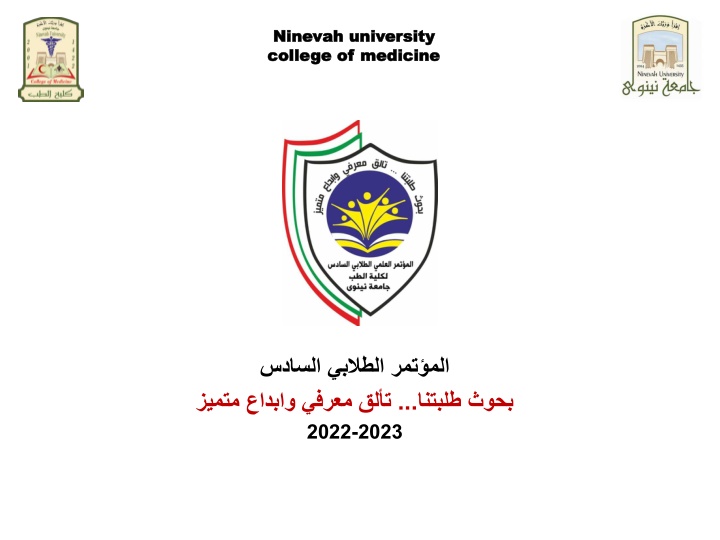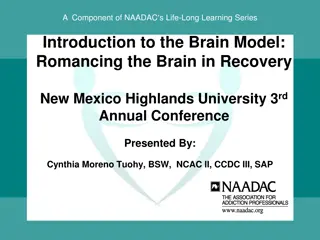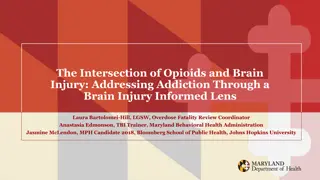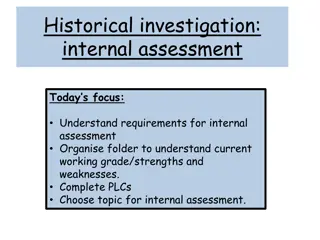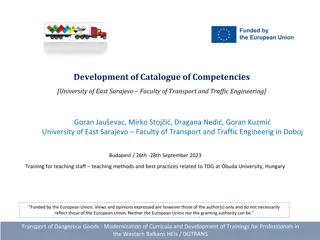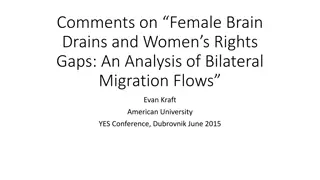Investigation into Brain Drain and Competencies in Mosul City
The research project delves into the phenomenon of brain drain in developing countries like Iraq, focusing on the perspective of academic teachers in Mosul. It explores the reasons driving migration of skilled professionals, such as inadequate financial returns and lack of support systems. The study aims to identify causes and propose solutions to mitigate brain drain in Mosul.
Download Presentation

Please find below an Image/Link to download the presentation.
The content on the website is provided AS IS for your information and personal use only. It may not be sold, licensed, or shared on other websites without obtaining consent from the author.If you encounter any issues during the download, it is possible that the publisher has removed the file from their server.
You are allowed to download the files provided on this website for personal or commercial use, subject to the condition that they are used lawfully. All files are the property of their respective owners.
The content on the website is provided AS IS for your information and personal use only. It may not be sold, licensed, or shared on other websites without obtaining consent from the author.
E N D
Presentation Transcript
Ninevah university Ninevah university college of medicine college of medicine 2022 ... - 2023
ESTIMATION OF RISK FACTORS FOR MIGRATION FROM THE POINT OF VIEW OF ACADEMIC TEACHERS IN MOSUL CITY ESTIMATION OF RISK FACTORS FOR MIGRATION FROM THE POINT OF VIEW OF ACADEMIC TEACHERS IN MOSUL CITY
Supervised by : Dr. Delal Ahmad Al-Aljumaily DR. Huda Abbas DEPARTMENT OF FAMILY AND COMMUNITY MEDICINE
PRESENTED BY : PRESENTED BY : Maha mohammed Maha mohammed Maab muhanad Maab muhanad Nada mustafa Nada mustafa Mohamme abdullah Mohammed abdullah Abdulsamee yasen Abdulsamee yasen
What is leading to brain drain and competencies from Iraq?
INTRODUCTION The phenomenon of brain drain is one of the most common social and economic problems in developing countries, including Iraq. It affects the structural composition of the population and human resources, It is not a modern phenomenon, but rather an old one, There was no specific time for scientists to emigrate, either individually or collectively, During the reign of Ptolemy I, many Greek writers and scholars moved to Alexandria because it adopted policies to attract the best.
INTRODUCTION Talent area It is indisputable that developing countries annually lose no less than thousands of doctors and scientists in favor of developed countries, especially the United States and Canada. Advantages and temptations, and thus obtaining the best elements and competencies are among the reasons driving them: Poor financial return for qualified people Failure to provide adequate protection and health care. material and moral, care, attention and respect for their achievements
OBJECTIVES To determine the causes of brain drain from the point of view of teachers in all scientific departments of the city of Mosul. To Know the proposals that must be available to reduce the phenomenon of brain drain from the point of view of teachers in the city of Mosul.
METHODOLOGY STUDY DESIGN It Is a descriptive analytic cross sectional study survey.
METHODOLOGY The samples included 53.6% of males and 46.4% of female Surveys were conducted among the population of Nineveh governorate the total number of academic teachers was 84 Microsoft office Excel 2013 for statistical analysis Google scholar iNSTRUMENTS OF THE STUDY THE TIME PERIOD OF STUDY WAS FROM 8 FEBRAUARY 2023- APRIL2023 Google form
Table (1): The relationship between Immigration Outside The Country and Residency Yes, I have thought of emigrating I did not thought of emigration Total 46 13 59 Urban (54.76%) (15.48%) (70.24%) 14 11 25 Rural (16.66%) (13.09%) (29.76%) 60 24 84 Total (71.42%) (28.57%) (100%) P-value = 0.041 Significant RESULT
Table (2):The relationship between Immigration Outside The Country and Sex Yes, I have thought of emigrating I did not thought of emigration Total 23 16 39 Male (27.38%) (19.05%) (46.42%) 37 8 45 Female (44.04%) (9.52%) (53.57%) 60 24 84 Total (71.42%) (28.57%) (100%) P-value = 0.019 Highly Significant RESULT
FIG2 The relationship between immigration outside the country and the educational leve RESULT
Table (3): The relationship between Immigration Outside The Country and Search For Safety And Security Yes, I have thought of emigrating I did not thought of emigration Total 53 10 63 Yes (63.1%) (11.9%) (75%) 7 14 21 No (8.33%) (16.67%) (25%) 60 24 84 Total (71.43%) (28.57%) (100%) P-value = 0.00001 Highly Significant RESULT
Table (4): The relationship between Immigration Outside The Country and Improve The Financial Condition Yes, I have thought of emigrating I did not thought of emigration Total 38 12 50 Yes (45.24%) (14.29%) (59.52%) 22 12 34 No (26.19%) (14.29%) (40.48%) 60 24 84 Total (71.43%) (28.57%) (100%) P-value = 0.260 Not Significant RESULT
Fig. 3 :The relationship between Immigration Outside The Country and The Income 30 24 23 25 20 15 12 11 10 10 RESULT 5 2 1 1 0 Very Good Good Medium Low Yes, I have thought of emigrating 11 23 24 2 I did not thought of emigration 1 12 10 1 Yes, I have thought of emigrating I did not thought of emigration
Table (5): The relationship between Immigration Outside The Country and Because you feel that your achievements and ideas have no value in your country Yes, I have thought of emigrating I did not thought of emigration Total 50 11 61 Yes (59.52%) (13.1%) (72.62%) 10 13 23 No (11.9%) (15.48%) (27.38%) 60 24 84 Total (71.43%) (28.57%) (100%) P-value = 0.0005 Highly Significant RESULT
Table (6): The relationship between Immigration Outside The Country and To fulfill your creative aspirations Yes, I have thought of emigrating I did not thought of emigration Total 52 11 63 Yes (61.9%) (13.1%) (75%) 8 13 21 No (9.52%) (15.48%) (25%) 60 24 84 Total (71.43%) (28.57%) (100%) P-value = 0.0001 Highly Significant RESULT
Table (7): The relationship between Immigration Outside The Country and Good services abroad (residential, transportation, educational, health and security) Yes, I have thought of emigrating 55 (65.48%) 5 (5.95%) 60 (71.43%) I did not thought of emigration 12 (14.29%) 12 (14.29%) 24 (28.57%) Total 67 Yes (79.76%) 17 (20.24%) 84 (100%) No Total P-value = 0.00002 Highly Significant
Table (8): The relationship between Immigration Outside The Country and Lack of material and moral support in the community Yes, I have thought of emigrating I did not thought of emigration Total 49 10 59 Yes (58.33%) (11.9%) (70.24%) 11 14 23 No (13.1%) (16.67%) (29.76%) 60 24 84 Total (71.43%) (28.57%) (100%) P-value = 0.0001 Highly Significant
Table (9)The relationship between Immigration Outside The Country and Provide adequate housing Yes, I have thought of emigrating I did not thought of emigration Total 44 12 56 Yes (52.38%) (14.29%) (66.67%) 16 12 28 No (19.05%) (14.29%) (33.33%) 60 24 84 Total (71.43%) (28.57%) (100%) P-value = 0.040 Significant
Table (10)The relationship between Immigration Outside The Country and The lack of suitable job opportunities within the country Yes, I have thought of emigrating I did not thought of emigration Total 46 11 57 Yes (54.76%) (13.1%) (67.86%) 14 13 27 No (16.67%) (15.48%) (32.14%) 60 24 84 Total (71.43%) (28.57%) (100%) P-value = 0.006 Highly Significant
Table (11): The relationship between Immigration Outside The Country and Lack of salaries and wages within the country Yes, I have thought of emigrating I did not thought of emigration Total 50 11 61 Yes (59.52%) (13.1%) (72.62%) 10 13 23 No (11.9%) (15.47%) (27.38%) 60 24 84 Total (71.43%) (28.57%) (100%) P-value = 0.0005 Highly Significant
Table (12): The relationship between Negative Effects of Immigration and Immigrants are discriminated against Yes, I have thought of emigrating I did not thought of emigration Total 62 11 73 Yes (73.81%) (13.1%) (86.9%) 8 3 11 No (9.52%) (3.57%) (13.1%) 70 14 84 Total (83.33%) (16.67%) (100%) P-value = 0.311 Not Significant
Table (13): The relationship between Negative Effects of Immigration and The suffering of immigrants from learning a new language and their need for years to master it Yes, I have thought of emigrating I did not thought of emigration Total 60 8 68 Yes (71.43%) (9.52%) (80.95%) 10 6 16 No (11.9%) (7.14%) (19.05%) 70 14 84 Total (83.33%) (16.67%) (100%) P-value = 0.012 Significant
DISCUSSION In our epidemiology Study, Immigration outside the country for residence ranked first , so P_ Value highly significant Randomized study In Al- Mustansiriya University research in 2007 ,To provide adequate housing ranked Second immigration outside the country and search for safety and security, ranked second percentage about 71.43% to search for security and safety ranked firs t the percentage about 85.3%
CONCLUSION Through the study , it was found a large percentage of competencies and expertise who want migration due many reasons like weakness of services and safety , to fulfill them creative aspirations and etc The study revealed the most common negative effects of migration is immigrants are discrimination against. Also through the study, patriotism is the common reason that prevented them from thinking of emigrating
RECOMMENDATION 1- Providing security and safety for all Iraqis, especially male and female teachers, as they suffer from kidnapping, killing and bombing. The state must provide adequate protection for educational facilities. 2- Serious interest by the government in teachers because they are a major national wealth, through fulfilling the material and moral desires of the teachers, through increasing salaries to match the salaries of university professors in Arab countries and activating the university service law, either morally, through the work of committees that carry out the task of publishing the professors writings, which It remained piled high with dust and did not see the light etc..
T H A N K Y O U F O R Y O U R A T T E N T IO N
